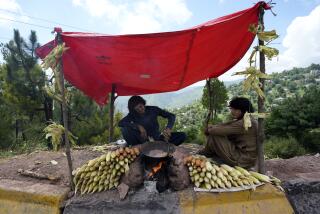$1-Billion Bailout Sought by Pakistan
- Share via
ISLAMABAD, Pakistan — Creditors demand money, foreign currency reserves are being drained to repay short-term loans and domestic price increases are overdue, so Pakistan is asking for help.
“There’s no way we can cover the losses ourselves; $1 billion we can make up on our own, but we need help with another billion,” said Sartaz Aziz, finance minister of the new government.
Japan was the first to respond, offering a $500-million aid package when President Ghulam Ishaq Khan visited Tokyo for the enthronement of Emperor Akihito.
In an effort to make up the first billion, Pakistan plans to raise domestic prices, implement strict oil conservation measures and push exports while reducing imports. Gasoline prices went up more than 40% in November.
In October, the United States suspended $500 million in aid because of suspicions that Pakistan has or is developing nuclear weapons.
“It doesn’t hurt us immediately,” Aziz said. “There’s still some aid in the pipeline.”
Because of the financial problems, former Prime Minister Benazir Bhutto may have found a silver lining in her stunning election defeat Oct. 24. Political analysts and economists say the opposition seats appear to be the safest place in Parliament at the moment.
Little was done about the economy for three months after Ishaq Khan dismissed Bhutto’s government Aug. 6 for alleged corruption.
The caretaker administration he appointed concentrated on keeping the nation afloat until a new government could be chosen. It refused to increase prices because of the imminent election, paying its bills instead with short-term loans at high interest rates.
Now, the economic problems are likely to interfere with the industrial revolution that conservative Prime Minister Nawaz Sharif has promised.
Even the left saw the victory of Sharif, a wealthy businessman from humble beginnings, as a catalyst for ending centuries of control by the feudal landlord class, to which Bhutto belongs.
Economists say fiscal realism will have to be an essential part of the Sharif government’s plans.
“You can’t just do things because you want to,” one said on condition of anonymity. “You’ve got to bite the bullet, increase prices or raise taxes or both.”
Foreign currency reserves have fallen to only $50 million, the inflation rate is rising and another $2 billion has been added to the foreign debt, raising it to about $15.5 billion.
A Western economist said the additional debt was largely due to the higher oil price. He said the International Monetary Fund was holding back nearly $300 million until Pakistan improved its economic performance.
Aziz said Iraq’s invasion of Kuwait in August was costing Pakistan about $33 million a month.
Sharif initially refused Aziz’s request for price increases because most of Pakistan’s 110 million people are landless laborers who earn an average of less than $400 a year.
Pakistan is one of the largest recipients of international aid, a total of about $3 billion a year. Some senior officials suggested that the government might have to suspend payments on the debt, but Aziz said that was not being considered.
More to Read
Sign up for Essential California
The most important California stories and recommendations in your inbox every morning.
You may occasionally receive promotional content from the Los Angeles Times.













